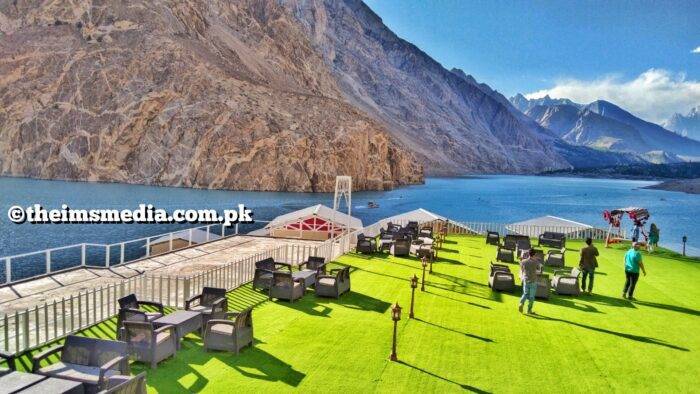
Importance of Attabad Lake, Shishkat Gojal Hunza, for Eco-Tourism
By: Hussain Ali Harri
Geographic History and location:
Attabad Lake, located in Shishkat Gojal, Hunza, is one of the most stunning natural attractions in northern Pakistan. Formed in 2010 after a massive landslide blocked the Hunza River, the lake has since become a symbol of resilience and beauty. Its crystal-clear turquoise waters, surrounded by towering mountains, offer a unique and peaceful environment for visitors seeking eco-tourism experiences.
Role of Natural Lake in this area:
The lake plays a vital role in promoting eco-tourism by attracting travelers who appreciate nature and wish to protect it. Activities like boating, kayaking, and hiking around the lake allow visitors to enjoy its natural beauty without harming the environment. Moreover, eco-friendly guesthouses and local guides help ensure that tourism benefits the community directly, creating jobs and encouraging the preservation of cultural traditions.
Importance of Attabad Lake Shishkat for Local and international people:
Attabad Lake also raises awareness about environmental changes and the importance of protecting fragile mountain ecosystems. By choosing eco-tourism, visitors contribute to sustainable development in Hunza, ensuring that this natural wonder remains unspoiled for future generations.
Attabad Lake in Shishkat Gojal, Hunza, is not just a breathtaking sight — it’s a hub for eco-tourism in northern Pakistan. Born from a natural landslide in 2010, its turquoise waters surrounded by mighty peaks offer a peaceful escape for nature lovers.
Benefits or opportunities of Attabad Lake in Eco-Tourism:
Eco-tourism here means enjoying boating, kayaking, and hiking while respecting the environment. Local guides, eco-friendly stays, and community-run services make sure tourism supports the people of Hunza and keeps their culture alive. Visiting Attabad Lake is more than a trip — it’s a way to protect nature, empower communities, and create memories without leaving a harmful footprint.
Steps to Protect Attabad Lake, Shishkat, for Eco-Tourism:
Protecting Attabad Lake, Shishkat Gojal Hunza, for Sustainable Eco-Tourism
Attabad Lake in Shishkat Gojal, Hunza, is one of Pakistan’s most stunning natural wonders — but it is facing serious environmental threats. In recent years, unplanned construction and poorly regulated recreational facilities have emerged around the lake. Large residential houses and hotels are being built without proper modern waste management systems, causing pollution that endangers both the lake’s ecosystem and the local climate.
Although government agencies pass environmental protection laws every year, a lack of proper enforcement means the damage continues. This puts not only the pristine waters of Attabad Lake at risk, but also the surrounding natural landscapes of Shishkat village, including its lush pastures and the high mountain habitats that have remained untouched for centuries.
The rapid melting of glaciers due to climate change and the pollution of rivers and streams are already harming local communities. If left unchecked, the area’s eco-tourism potential — a vital source of sustainable income for residents — will be lost.
Stainable Eco-Tourism Action Plan:
- Introduce strict building regulations to control unplanned development.
- Install eco-friendly waste treatment systems in all hotels and guesthouses.
- Promote community-led eco-tourism projects that provide employment opportunities while preserving local culture.
- Educate locals and tourists on the importance of protecting natural resources.
- Enforce environmental laws with regular inspections and penalties for violations.
By protecting Attabad Lake and its surroundings, we can ensure that this jewel of Hunza remains a clean, safe, and world-class eco-tourism destination for generations to come.
To keep Attabad Lake beautiful, clean, and sustainable for eco-tourism, both the local community and government agencies must work together. Here are some important steps:
Waste Management System
Install dustbins along the lake and nearby tourist spots.
Arrange regular waste collection and proper disposal.
Ban single-use plastics to prevent littering in and around the lake.
Eco-Friendly Tourism Infrastructure
Promote eco-lodges and guesthouses that use solar power, energy-saving appliances, and local materials.
Build proper walking trails and boat docks to minimize damage to the shoreline.
Strict Pollution Control
Regulate the number of motorboats to reduce fuel pollution in the lake. Encourage the use of electric or paddle boats for eco-friendly water activities.
Environmental Awareness Campaigns
Educate tourists and locals about the importance of preserving the lake.
Use signboards, brochures, and social media to promote responsible behavior.
Community Involvement
Train locals as eco-tour guides and nature conservation volunteers.
Create small businesses for locals that support eco-tourism, like handicrafts and organic food stalls.
Regular Monitoring & Research
Test water quality regularly to detect and address pollution early.
Work with environmental experts to plan long-term lake preservation strategies.
By following these steps, Attabad Lake can remain a clean, safe, and world-class eco-tourism destination — protecting nature while uplifting the local economy.

